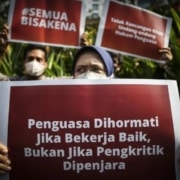
Demonstrators march in support of Palestine at an organised protest in Jakarta on 7 April 2024. Photo by Muhammad Adimaja for Antara.
The recent revelation that Indonesia is considering normalising ties with Israel as part of its bid to join the Organisation for Economic Cooperation and Development (OECD) has surprised the international community and the Indonesian public.
The Jerusalem Post reported on 11 April that discussions to normalise relations between the two countries had been in the works but were abruptly sidelined following the outbreak of the ongoing war in Gaza.
The OECD Secretary-General, Mathias Cormann, had reportedly negotiated a commitment from Indonesia to soften its opposition to Israel to assist Indonesia’s entry to the OECD, a grouping of 38 developed nations that includes Israel.
The Indonesian government’s actual stance remains ambiguous. However, any move to normalise relations with Israel could have major repercussions for Indonesian foreign policy and the domestic political landscape.
Indonesia’s history of Palestinian solidarity
For decades Indonesia has maintained a steadfast position on Palestine. The country’s first President, Soekarno, set the tone with his unwavering support for Palestine and other oppressed nations, and made this stance a central feature of Indonesia’s foreign policy.
However, the notion of normalising relations between Israel and Indonesia is not entirely new. During President Abdurrahman “Gus Dur” Wahid’s tenure, from 1999 to 2001, there were efforts to initiate trade with Israel. Gus Dur even discussed the possibility of establishing diplomatic relations. He argued Indonesia could not play a role in Palestinian-Israeli peace negotiations without maintaining diplomatic ties with both countries.
In late 2021, Israeli media reported ongoing efforts, led by then Minister of Defence Prabowo Subianto (now president-elect), to normalise relations between Indonesia and Israel.
Despite the absence of formal diplomatic ties, the two countries have been cooperating on trade and tourism, especially in agriculture. High-level meetings, including interactions between Prabowo and Israeli officials, and discussions between the foreign ministers of the US and Indonesia, have indicated a gradual move towards normalisation.
In a statement released on 20 February 2024, the OECD formally announced it was opening accession discussions with Indonesia. The details of these discussions between Indonesia and the OECD remain unclear, but it is clear enough that Indonesia’s accession to the OECD would require unanimous support from all member countries – including Israel.
The timing of the recent revelations is very inconvenient for the Indonesian government. The Indonesian public, historically sympathetic to the Palestinian cause, is very unlikely to react favourably to a sudden pivot towards Israel given the ongoing violent conflict in Gaza. This puts Indonesian politicians in a tight spot – particularly Prabowo, who is yet to comment on The Jerusalem Post’s claims.
Normalisation would have domestic political consequences
The normalisation of relations with Israel has the potential to reshape the domestic political landscape in Indonesia. Popular resistance to normalisation could manifest in widespread protests and civil unrest.
Indonesia still has a vibrant civil society and a history of mass movements shaping policy decisions. Any move toward normalisation, without concurrent progress in the Israeli-Palestinian peace process, could trigger large-scale demonstrations, potentially destabilising the country and presenting a significant challenge to the government’s authority.
It would also exacerbate political polarisation within Indonesia. Political figures could leverage the issue to consolidate power, appealing to nationalist sentiments or religious convictions. The Indonesian public, deeply divided on this issue, might see a sharpening of lines between economic pragmatists, who advocate for global diplomatic engagement, and idealists, who call for solidarity with Palestine for a variety of religious and political reasons. This polarisation could complicate governance and policymaking, creating a more fractious political landscape.
It is therefore not surprising that Minister of Foreign Affairs Retno Marsudi has closed down the possibility of normalising relations with Israel until there is peace in Palestine with a two-state solution. However, this stance contradicts reporting that Indonesia was considering normalisation in exchange for OECD membership, and the government has not commented on the substance of its discussions with the OECD. The resulting ambiguity only feeds speculation and leaves plenty of room for heated debate.
It is not inconceivable that Indonesia might seek to normalise relations in advance of a two-state solution, particularly given Joko Widodo’s history of prioritising economic development over ideological positions. However, given the strong public sentiment against normalisation, it would likely be political suicide for whoever is assigned the unenviable role of selling normalisation to the public. Political figures aspiring to a position in the next cabinet will want to distance themselves from it.
What would normalisation mean for Indonesia’s place in the world?
From Israel’s perspective, normalisation with Indonesia – the world’s largest Muslim-majority country – would be a strategic win. It would serve as a counter-narrative to the increasing isolation it has faced over its actions in Gaza. It would also bolster Prime Minister Benjamin Netanyahu’s standing on the global stage at a time when he is under siege, both at home and abroad.
However, the risks for Indonesia are manifold. Normalisation could destabilise Indonesia’s diplomatic relationships, particularly with Muslim-majority countries that remain opposed to normalisation with Israel. Although some nations in the Middle East, like Saudi Arabia, have weighted up establishing formal relations with Israel, none have considered doing so during the current conflict. Others still steadfastly support the Palestinian cause.
Normalisation could also be seen as diluting Indonesia’s in-principle opposition to colonialism and imperialism, which has defined its foreign policy since its inception. Indonesia historically played a significant role in the Asia and Africa Conference and the Non-Aligned Movement, positioning itself as an advocate for developing nations. Normalisation with Israel might be perceived as a departure from that historical role. This would diminish Indonesia’s standing among developing countries, and, arguably, its diplomatic reach.
However, any decision on whether to normalise ties with Israel should not be based merely on strategic calculations but also on the pursuit of peace and justice in the Middle East. Indonesia must remain steadfast in its commitment to these principles, and ensure its foreign policy continues to champion the causes of oppressed nations and the ideals upon which the nation was founded.
Perhaps most importantly, Indonesia must ensure its steps forward do not betray the trust and expectations of its people. The majority of Indonesians stand firmly against establishing ties with Israel while Palestinians lack a state of their own, and their sentiments should not be ignored.
As Indonesia deliberates on this pivotal shift in foreign policy, it is important that the decision-making process is transparent and inclusive and reflects the collective will and values of the Indonesian people.











 https://www.flickr.com/photos/130075348@N08/51219074247/
https://www.flickr.com/photos/130075348@N08/51219074247/